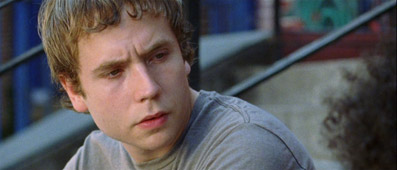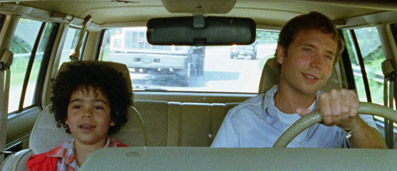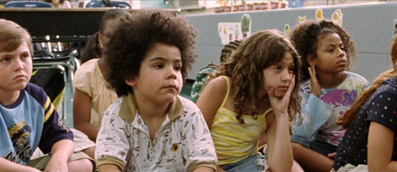|
The introverted, confused, and alienated twenty-something is modern independent cinema's favourite American paradigm. There's nothing these low-budget directors like more than a young man or woman, broken free of the strictures of education, left lacking direction and questioning their place in the world. These characters almost always present a kind of self analysis. Young writers put a fair dose of their own experiences into crafting them and paying audiences connect with the nebulous uncertainty of being grown up, unsure, and on your own. With this easy sympathy to hand, many of these films quickly devolve into naval-gazing, with nothing more interesting to say than: "Oh, isn't it hard to be us."
Morgan J. Freeman's Just Like the Son bears many of it's contemporary's hallmarks. Daniel (Mark Webber) is a down-and-out petty crook with no purpose and no future, dragged in front of a judge for the third time after a botched robbery attempt. He is given a final warning and a hefty chunk of community of service, with the promise of prison if he reoffends. Thankfully, Freeman is interested in more than just a long hard look at his lead character's flaws. There is an actual narrative, through which we meet people with a different outlook on life and explore when, if ever, it's right to do the wrong thing.

Mark Webber plays his part with an understated petulance that, while similar to young men in other American movies, is a character all his own. He is an actor of clear ability and a notch or two above the rest of the adult cast. Webber is already a performer of note, who has the right makeup to break through into Hollywood's mainstream should he find the right vehicle. Given that, it's no surprise to see him turning in a decent performance here. More revelatory is the 6-year-old Antonio Ortiz, who plays Boone, an upbeat juvenile New Yorker who Daniel meets while fulfilling his community service at a local school. Employed as a janitor, Daniel quickly works his way into the principal's good graces, resulting in a chance call-up to read a story book in Boone's 1st grade class. Cue some effective editing and, before you know it, the pair are bonding as he babysits the youngster after school. With heart-melting innocence, Boone tells his newfound friend about a troubled family life and the imminent danger of being carted off to the evil "Red House" – a home for orphaned children. When Boone suddenly disappears from school, Daniel calls in his criminal pal Grant (Brendan Sexton III) to orchestrate a kidnapping. Youngster in tow, Danny and his charge set off on a road trip to find Boone's long-lost sister.
With the dynamic duo on the highway, Just Like the Son finally hits its stride. Early on, unconvincing performances from the supporting cast (Adrien Martinez aside) get in the way of a solid script. But with other characters jettisoned, we are left with far and way the film's strongest pair. The relationship between Webber and his companion comprises the core of the entire picture. If this emotional connection had faltered, then the whole film would sink to its knees. Joyously, the twosome make a believable and delightful double-act, thanks in no small part to the efforts of Antonio Ortiz. For an actor so young, he turns in a remarkably adept performance. Boone effectively combines a wide-eyed innocence with a confident American charm that contrasts excellently with Daniel's reserved attitude. He realistically considers their journey an adventure, but when things aren't going quite so swimmingly, Ortiz has the ability to convincingly portray a child with serious abandonment issues.

Limitations of budget and independent ethos mean that Just Like the Son is shot economically. Morgan J. Freeman relies almost entirely on natural light and settles for the everyday look of his Lower East Side locations. Despite these restrictions, Freeman demonstrates that efficiency does not have to mean simplicity. On the surface, his work with the camera is basic and un-showy, but delve a little deeper and you'll soon discover that he is working the lens like a well oiled machine. Numerous different angles comprise every scene, Freeman and his team contriving to give us a wider view of the action and, as a result, a greater insight into the emotional interactions between his characters. The framing of shots in Just Like the Son occasionally verges on the beautiful. One scene in particular displays Freeman's excellent feel for the cinema's most powerful tool. Having left Boone in a motel room to go carousing with some loose women, Daniel returns to find the 6-year-old awake and huddled in the corner of the room. The camera settles on a view that incorporates the entire back wall, with the fearful child cowering in one corner of the shot. This talent to enhance his actor's performances so effectively marks Freeman out as a director worth paying attention to.
There's an interesting question at the heart of this film that is key to much of Freeman's work. He himself has stated that this picture forms the second part of a planned trilogy which deals with a particular conundrum: When is it right to commit a crime? In this case, the audience is asked to fathom for themselves whether or not Daniel was right to snatch Boone away from the child-care system, to take him to a place where he might be happier. This is an undeniably interesting idea, but Just Like the Son falls short in some areas that undermine the philosophy. Daniel is a troubled man who lacks purpose, but he is clearly also an intelligent soul. So why does he believe Boone so implicitly? He has scant more to go on than the boy's claims about his mother's illness and a rumoured sister in Texas. He never meets any of these people or anyone who can corroborate Boone's story. The only person he does confide in is the school principal who, without any reason to lie, tells Daniel that his young friend is prone to concocting elaborate fabrications.

Despite a choppy opening act and a little narrative vagueness, Just Like the Son, is comfortably buoyed along by a competent script and the easy chemistry between the two leads. There are few moments of real tension, but copious amounts of warm friendship. It's an easy film to watch and, in the capable hands of Morgan J. Freeman, at least attempts to say something a little more complex. There are undoubtedly flaws, many of them glaring and plenty of them to do with acting, but there's also lots to be enjoyed. Perhaps the most glowing recommendation I can give is that, after the climax I felt like I wanted to know more about the continuing lives of Daniel and Boone.
Just Like the Son was shot on the low budget favourite of Super-16mm and framed 2.35:1, which has been anamorphically enhanced here, or at least I think it has – a small glitch with the preview disc meant that I had to manually unsqueeze the image, which I'm assuming has been sorted for the release disc. Otherwise the image quality is very good, having the richness you associate with film stock and with none of the compromises that are sometimes associated with the smaller frame format, with a decent level of detail and minimal film grain. The brightness feels a little turned up at times, but this does feel like an artistic decision rather than a transfer issue, and the contrast is always well balanced, with solid black levels achieved without losing detail at either end of the brightness spectrum.The colours have an almost pastel feel, something that continues beyond the confines of the school interior, where such a colour scheme is part of the mise-en-scène.
The Dolby 2.0 soundtrack is a gentle one in which dialogue and the gentle piano-driven score figure the strongest. A clear and decently mixed track, it does lack the fullness of more 'produced' tracks and appears to be mono, sitting very much front and centre throughout.
There are a smattering of extras here, which should be enough to satiate anyone with a passing interest in learning more about the film. The Making of Just Like the Son (07:07) is a brisk piece comprised mainly of interviews with the cast and crew. There are a few nuggets of interesting information, but it suffers from a some basic production errors. For one thing, the members of the crew that appear are never identified, leaving you to guess if you're hearing the opinions of the AP, the DP, or even the director. The longer Cast Interviews (28:02) are the meat from the which the making-of is cut. Mark Webber is comfortable, Brandon Sexton III is cheery, Rosie Perez is irritating, and Antonio Oritz is charming.
The Director's Statement is a paragraph or two of text that provides more insight into the deeper message of the film than any of the other offerings. This is the only extra that I would actively recommend delving into. There's a trailer (03:05) for those with a short memory and Breaking Glass Pictures Presents (03:05) which is exactly the same trailer, reproduced for no fathomable reason.
In its director and two leading actors, Just Like the Son has half the makings of a very good film. Sadly, a few narrative slips and an unhelpful supporting cast drag it down a notch. Despite this, there's plenty to be enjoyed in the expert camerawork displayed by Freeman and the charming companionship that develops between Boone and Daniel. It's ultimately a very pleasant film to watch, especially once the turgid first act has passed you by.
|